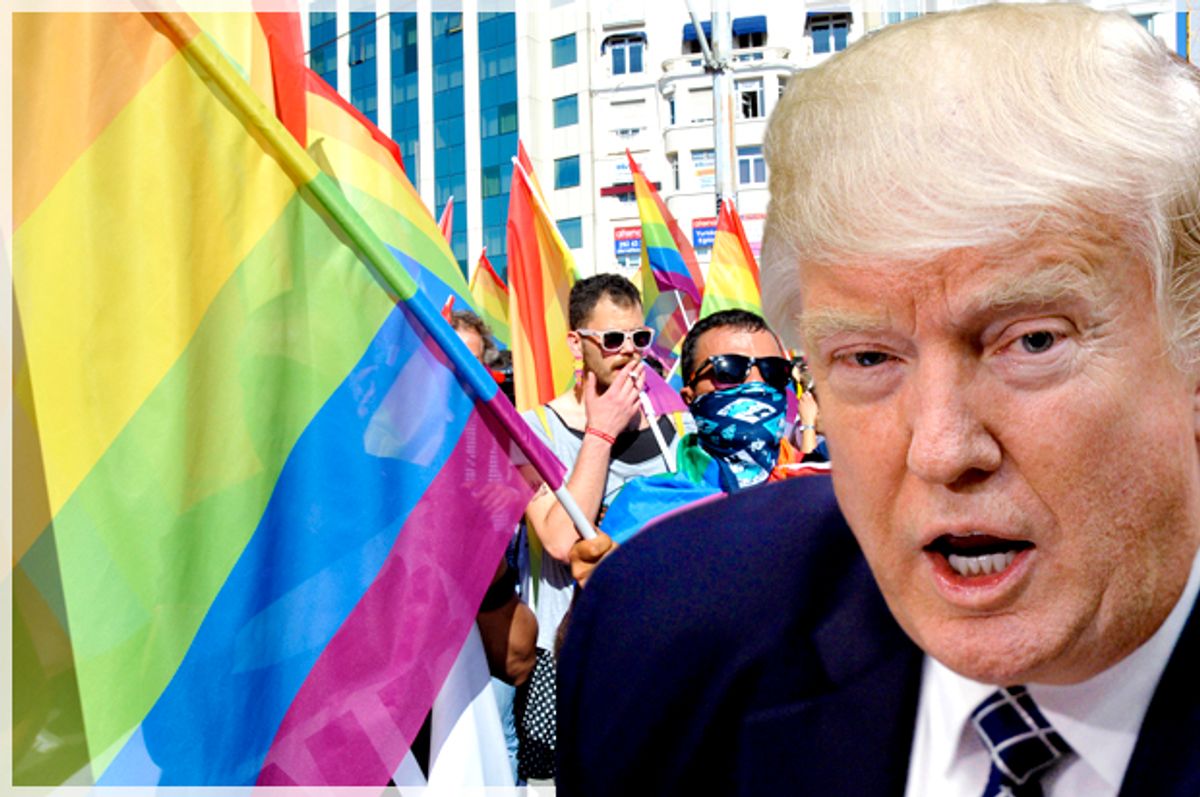Now that President Donald Trump has reinstated a ban on transgender individuals serving in the American military "in any capacity," the question needs to be asked:
Remember the days when Trump said he was a pro-LGBT Republican?
This seemingly open-minded attitude can be traced all the way back to 2000, when Trump was exploring running as a presidential candidate for the Reform Party. During an interview with The Advocate, Trump said that amending the Civil Rights Act of 1964 to expand its protections to LGBT individuals was "only fair," supported "a very strong domestic-partnership law" and insisted that Don't Ask, Don't Tell had "clearly failed."
By 2011, Trump was telling the Christian Broadcasting Network that "there can be no discrimination against gays." Four years later, Trump still remained comparatively progressive on LGBT issues, at least when compared to the other Republican presidential candidates. In 2015, he told NBC's Chuck Todd that he did not feel sexual orientation "should be a reason" to fire employees, even though 31 states at that time lacked protections for LGBT members of the workforce.
This isn't to overstate Trump's attitudes toward the LGBT community. He has never spoken out in a forceful way for transgender rights and has outright opposed marriage equality. When asked by MSNBC in 2015 whether Trump was the most pro-LGBT Republican running for president, executive director of the pro-LGBT Log Cabin Republicans Gregory T. Angelo argued that that "might be going a little overboard."
"It’s a complicated relationship that Trump has with the LGBT community," Angelo said, "but if ever there was a group that can be said to have had a warm relationship with Trump, it’s LGBT individuals."
By 2016, Trump continued to send mixed signals to the LGBT community. On the one hand, his Republican convention was the first one to contain a transgender speaker (Caitlyn Jenner) as well as a homosexual speaker (Peter Thiel). At the same time, this was the convention which nominated Indiana Gov. Mike Pence as its vice presidential candidate, which raised questions about the policies on LGBT issues that Trump would pursue as president, ones that lingered after his election.
Trump's rhetoric was equally confusing. Despite his regular appeals to Christian right-wingers that he was one of them, candidate Trump was willing to declare in June 2016 that he was a "real friend" of the LGBT community and then again in July of that year that he would "protect" its members from discrimination. Perhaps most notably, he declared during his acceptance speech at the Republican National Convention that he would "do everything in my power to protect LGBTQ citizens from the violence and oppression of a hateful foreign ideology."
Trump used the shooting of a gay nightclub in Orlando, Florida, as a tool to attack Islam during a campaign rally, saying, "A radical Islamic terrorist targeted the nightclub, not only because he wanted to kill Americans, but in order to execute gay and lesbian citizens, because of their sexual orientation."
If we don't get tough, and if we don't get smart, and fast, we're not going to have our country anymore. There will be nothing, absolutely nothing, left. The killer, whose name I will not use, or ever say, was born in Afghan, of Afghan parents, who immigrated to the United States. . .
I refuse to allow America to become a place where gay people, Christian people, Jewish people are targets of persecution and intimidation by radical Islamic preachers of hate and violence.
So much for the "tolerant and open society" Trump wants to go with.



Shares